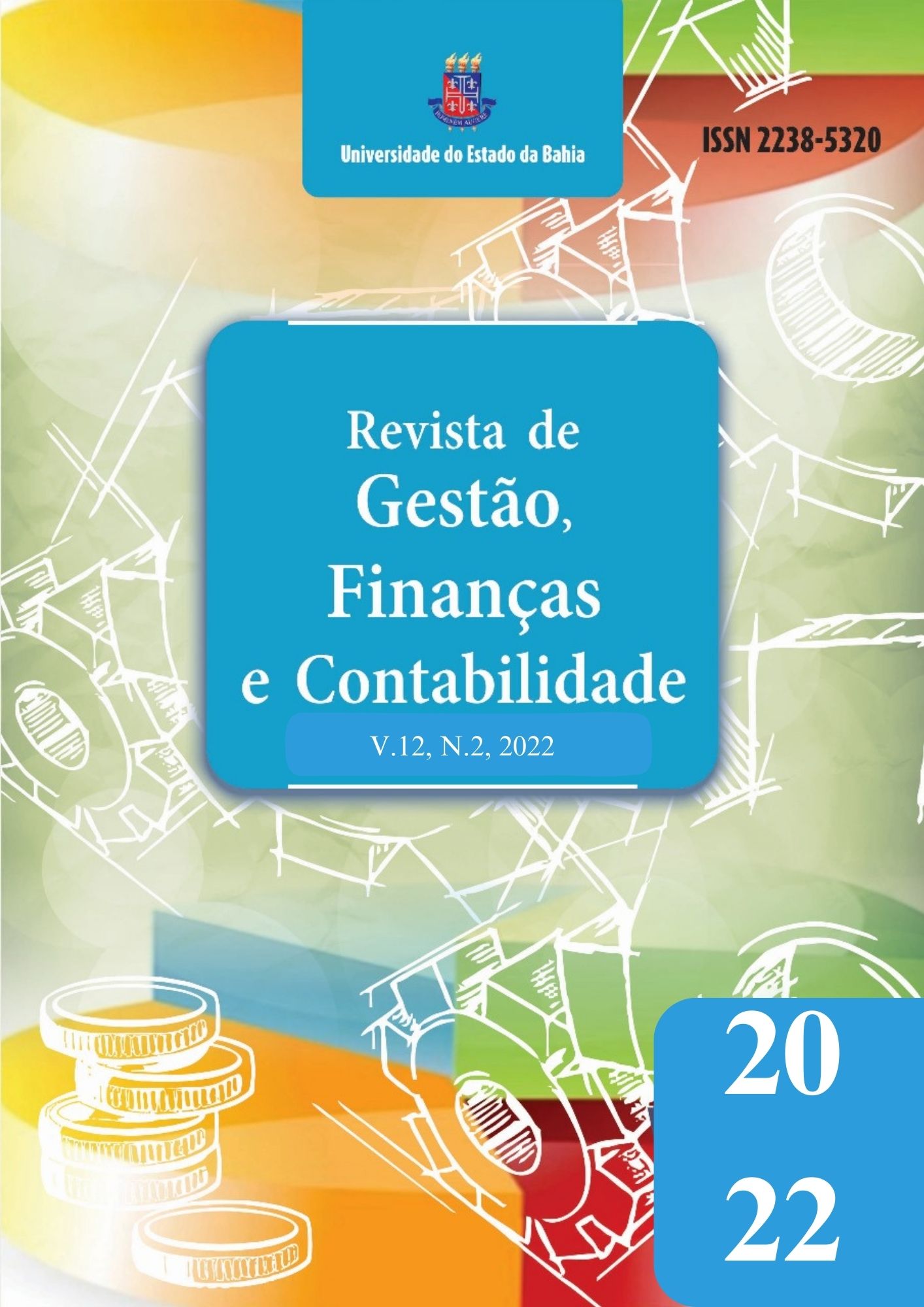Terceiro Setor: Uma Revisão de Literatura
DOI:
https://doi.org/10.18028/rgfc.v12i2.12478Palavras-chave:
Terceiro setor. Estado da Arte. Revisão de literatura. Objetivos sociais.Resumo
Com as mudanças que ocorreram no cenário mundial, as diferenças sociais se intensificaram e, em alguns países, há questões que necessitam de atenção especial. Nesse contexto emergem as iniciativas da sociedade civil organizada e do empresariado com objetivos sociais, que se consubstancia no denominado Terceiro Setor. O presente estudo busca compreender o estado da arte do constructo “Terceiro Setor” nos últimos cinco anos, de 2013 a 2017, por meio de revisão de literatura de publicações cientificas, na Plataforma Web of Science, que inclui mais de 21.000 periódicos acadêmicos, de todo o mundo, revisados por pares. Para essa investigação utilizou-se o levantamento bibliográfico acerca da temática central, como estratégia de pesquisa, analisando os conteúdos disponibilizados na base de dados Current Contents Connect. Nesta base foram encontrados 64 trabalhos, sendo selecionados os trinta trabalhos mais citados, que versam sobre o constructo Terceiro Setor, dentre eles 78% publicados na Inglaterra, sendo que 95% desses foram publicados na área de economia e negócios e administração pública, evidenciando assim um potencial emergente de pesquisa. Se faz necessário ampliar as pesquisas realizadas sobre organizações que atuam no Terceiro Setor, de forma a abranger outras realidades além das apresentadas neste trabalho.
Downloads
Referências
ARIZA-MONTES, A., ROLDAN-SALGUEIRO, J. L., & LEAL-RODRIGUEZ, A. (2015). Employee and Volunteer An Unlikely Cocktail? Nonprofit Management & Leadership, 25(3), 255-268.
BLOICE, L., & BURNETT, S. (2016). Barriers to knowledge sharing in third sector social care: a case study. Journal of Knowledge Management, 20(1), 125-145.
BOVAIRD, T. (2014). Efficiency in Third Sector Partnerships for Delivering Local Government Services: The role of economies of scale, scope and learning. Public Management Review, 16(8), 1067-1090.
BUSER, M. (2013). Tracing the Democratic Narrative: Big Society, Localism and Civic Engagement. Local Government Studies, 39(1), 3-21.
BUTCHER, J. (2015). The third sector and government in Australia: Not-for-profit reform under Labor, 2007-13. Australian Journal of Political Science, 50(1), 148-163.
CORDERY, C. & SINCLAIR, R., (2013). Qualitative Research in Accounting & Management, Vol. 10 No. 3/4, pp. 196-212q. DOI 10.1108/QRAM-03-2013-0014
CRUZ, I., AZEVEDO, G., SILVA, A. & CHIAU, A., (2017) Mental Accounting: A Systematic Review. Estudos do ISCA – Série IV Nº15. Universidade de Aveiro. http://hdl.handle.net/10773/21157
DEFOURNY, J. AND PESTOFF, V. (2014), "Towards a European Conceptualization of the Third Sector", Accountability and Social Accounting for Social and Non-Profit Organizations (Advances in Public Interest Accounting, Vol. 17), Emerald Group Publishing Limited, Bingley, pp. 25-87. https://doi.org/10.1108/S1041-706020140000017001
DEY, P., & TEASDALE, S. (2016). The tactical mimicry of social enterprise strategies: Acting "as if' in the everyday life of third sector organizations. Organization, 23(4), 485-504.
DURURU, J., ANDERSON, C., BATES, M., MONTASSER, W., & TUDOR, T. (2015). Enhancing engagement with community sector organisations working in sustainable waste management: A case study. Waste Management & Research, 33(3), 284-290.
FERNANDES, RUBEM C. (1994) Privado porém Público: o terceiro setor na América Latina. Rio de Janeiro: Relume Dumará.
HARDY, L., & BALLIS, H. (2013). Accountability and giving accounts Informal reporting practices in a religious corporation. Accounting Auditing & Accountability Journal, 26(4), 539-566.
HOPPER, T., & BUI, B. (2016). Has Management Accounting Research been critical? Management Accounting Research, 31, 10-30.
KO, W. W., & LIU, G. (2015). Understanding the Process of Knowledge Spillovers: Learning to Become Social Enterprises. Strategic Entrepreneurship Journal, 9(3), 263-285.
LEE, C. W., & ROMANO, Z. (2013). Democracy's New Discipline: Public Deliberation as Organizational Strategy. Organization Studies, 34(5-6), 733-753.
LINDSAY, C., OSBORNE, S. P., & BOND, S. (2014). The 'new public governance' and employability services in an era of crisis: challenges for third sector organizations in Scotland. Public Administration, 92(1), 192-207.
MANVILLE, G., & BROAD, M. (2013). CHANGING TIMES FOR CHARITIES Performance management in a Third Sector Housing Association. Public Management Review, 15(7), 992-1010.
REES, J AND MULLINS, DAVID AND BOVAIRD, TONY (2012) Third sector partnerships for public service delivery: an evidence review. Working Paper. University of Birmingham, Birmingham.
RUUSKANEN, P., SELANDER, K., & ANTTILA, T. (2016). Third-sector job quality: evidence from Finland. Employee Relations, 38(4), 521-535.
Simaens, A., & Koster, M. (2013). Reporting on sustainable operations by third sector organizations a signaling approach. Public Management Review, 15(7), 1040-1062.
TENBENSEL, T., DWYER, J., & LAVOIE, J. (2014). How not to kill the golden goose reconceptualizing accountability environments of third-sector organizations. Public Management Review, 16(7), 925-944.
WEISBROD, B. A. (1972). Toward a Theory of the Voluntary Non-profit Sector in a Three-Sector Economy. In E. S. Phelps (Ed.), Conference on Altruism and Economic Theory, Russel Sage Foundation (No. 1972; Institute for Research on Poverty (IRP)). Phelps, E. S. https://www.irp.wisc.edu/publications/dps/pdfs/dp13272.pdf
WINDRUM, P. (2014). Third sector organizations and the co-production of health innovations. Management Decision, 52(6), 1046-1056.
WONG, R., & MILLINGTON, A. (2014). Corporate social disclosures: a user perspective on assurance. Accounting Auditing & Accountability Journal.
Downloads
Publicado
Edição
Seção
Licença
Copyright (c) 2023 Revista de Gestão, Finanças e Contabilidade

Este trabalho está licenciado sob uma licença Creative Commons Attribution-NonCommercial 4.0 International License.
Autores que publicam na RGFC concordam com os seguintes termos:
- Autores mantém os direitos autorais e concedem à revista o direito de primeira publicação, com o trabalho simultaneamente licenciado sob a Creative Commons Attribution License (https://creativecommons.org/licenses/by-nc/4.0/), permitindo o compartilhamento do trabalho com reconhecimento da autoria do trabalho e publicação inicial nesta revista;
- Autores têm autorização para assumir contratos adicionais separadamente, para distribuição não-exclusiva da versão do trabalho publicada nesta revista (ex.: publicar em repositório institucional ou como capítulo de livro), com reconhecimento de autoria e publicação inicial nesta revista;
- Autores têm permissão e são estimulados a publicar e distribuir seu trabalho online (ex.: em repositórios institucionais ou na sua página pessoal), já que isso pode gerar alterações produtivas, bem como aumentar o impacto e a citação do trabalho publicado. Porém deve-se observar que uma vez aprovado pelos avaliadores, o manuscrito não poderá sofrer mais alterações. Caso o autor deseje fazê-lo, deverá reiniciar o processo de submissão.

